Filter by
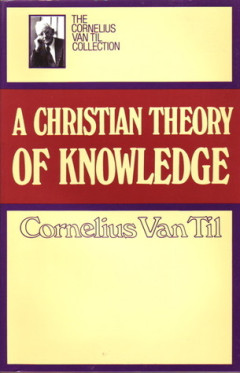
A Christian Theory Of Knowledge
In This Volume Cornelius Van Til Focuses on the nature of a commitment to biblical authority and its implications for non-Christian thought. To some degree an expansion of and supplement to his The Defense of the faith, this book compares and contrasts a consistently Christian approach to knowledge with interpretations that have been given to it throughout church history. Van Til gives specific…
- Edition
- -
- ISBN/ISSN
- 0-87552-480-X
- Collation
- Soft Cover, 390 hlm, 14x21 cm
- Series Title
- The Cornelius Van Til Collection
- Call Number
- 230.01

Mendambakan Kerajaan: Ibadah, Wawasan Dunia, dan Pembentukan Budaya (Liturgi …
Filsuf James K. A. Smith membentuk kembali proyek pendidikan Kristen di Mendambakan Kerajaan. Jilid ini adalah yang pertama dari seri buku tiga-jilid yang pada akhirnya akan menyediakan theologi budaya yang komprehensif. Seluruh serinya akan membahas masalah penting dalam ontologi, antropologi, epistemologi, dan filsafat politik. Mendamakan Kerajaan memfokuskan pendidikan di sekitar tema liturg…
- Edition
- 1
- ISBN/ISSN
- 978-602-393-132-3
- Collation
- Soft Cover, 304 hlm, 14x21cm
- Series Title
- Liturgi Budaya
- Call Number
- 264.001
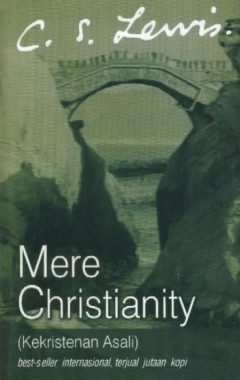
Mere Christianity: Kekristenan Asali
Sebagai salah satu introduksi yang paling populer dan dicintai mengenai iman Kristen yang pernah ditulis, Mere Christianity telah terjual sebanyak jutaan kopi di seluruh dunia. Buku ini menyajikan secara utuh siaran legendaris Lewis pada tahun-tahun peperangan, siaran-siaran yang dimaksudkannya untuk sekadar "menjelaskan dan membela kepercayaan yang umum bagi hampir semua orang Kristen di segal…
- Edition
- -
- ISBN/ISSN
- 9795421980
- Collation
- Softcover; 308 hlm.; 14.7 cm x 20.8 cm
- Series Title
- -
- Call Number
- 230

Pengantar ke dalam Teologi Reformed: Sebuah Penolong Untuk Memahami Kedalaman…
Apa itu sebenarnya Theologi Reformed? Apa yang menjadi keunikan dari Theologi Reformed? Mengapa kita perlu belajar, mengenal, mengetahui tentang Theologi Reformed? Saat ini dunia kekristenan telah dilanda oleh banyaknya pengajaran. Gereja A menawarkan pengajaran tentang Tuhan yang mereka percaya, gereja B menawarkan pengajaran tentang Tuhan yang mereka percaya, gereja C pun tak kalah ketingg…
- Edition
- 2
- ISBN/ISSN
- 9798131266
- Collation
- Soft Cover, 122 hlm, 14,3x20,5cm
- Series Title
- Seri Pembinaan Teologi
- Call Number
- 230.42
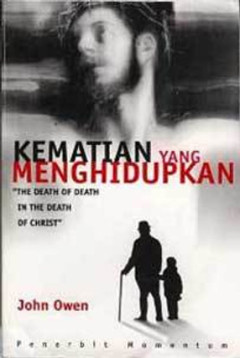
Kematian Yang Menghidupkan: The Death of Death in the Death of Christ
Dalam risalah ini, John Owen mengupas apa yang dikerjakan Kristus melalui kematianNya bagi penebusan umat pilihanNya. Melalui uraian ayat-ayat Alkitab yang teliti, ia menunjukkan bahwa ajaran penebusan universal (universal redeption) tidak sesuai sama sekali dengan ajaran Alkitab dan sangat merusak berita Injil yang sejati. Risalah ini dipersembahkan kepada mereka yang dengan penuh kesetiaan m…
- Edition
- -
- ISBN/ISSN
- 9789798131127
- Collation
- Softcover; 146 hlm.; 11 x 17.5 cm
- Series Title
- -
- Call Number
- 234.9

Gairah Allah Bagi Kemuliaan-Nya (God's Passion for His Glory): Menghidupi Vis…
Di dalam esainya, Tujuan Allah Menciptakan Dunia, sang theolog besar Jonathan Edwards menyatakan bahwa tujuan ultimat Allah adalah manifestasi kemuliaan-Nya di dalam kebahagiaan tertinggi dari mahluk ciptaan-Nya.. John Piper telah mendedikasikan tiga puluh tahun pelayanannya untuk menjelajahi implikasi-implikasi dari kebenaran yang mencengangkan ini terhadap kehidupan dan pelayanan. Memahami…
- Edition
- 1
- ISBN/ISSN
- 9789793292366
- Collation
- Softcover; 334 hlm.; 15.4 x 23.5 cm
- Series Title
- -
- Call Number
- 231.765

Kesukaan Allah: The Pleasures of God
Anda belum benar-benar dikatakan mengenal seseorang sampai anda mengetahui apa yang dapat membuatnya benar-benar bahagia. Kesukaan kita adalah ukuran untuk mengetahui karakter kita yang sesungguhnya demikian pula dengan Allah. Kita dapat menyadari kebesaran kemuliaan-Nya bersuka. Oleh karena itu, kita semestinya berusaha memahami "kesukaan Allah." Buku ini bukan mengenai diri Anda. Buku ini …
- Edition
- 1
- ISBN/ISSN
- 9789793292465
- Collation
- Softcover; 458 hlm.; 15.5 x 23.5 cm
- Series Title
- Meditasi Mengenai Kegemaran Allah di dalam Keberadaan-Nya Sebagai Allah
- Call Number
- 231
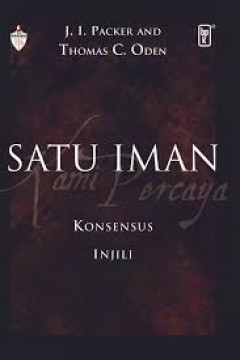
Satu Iman : Konsensus Injil
Yesus Kristus Menjanjikan Kesatuan bagi Gereja-Nya Apakah kaum injili terus terpecah belah menjadi fragmen-fragmen kecil seperti yang ditakutkan oleh sebagian orang? atau apakah ada bukti yang jelas tentang kesatuan itu dalam kalangan evangelikalisme? Teolog terkenal J.I. Packer dan Thomas C. Oden mengemukakan bukti adanya konsensus yang signifikan di antara kaum injili yang mempersatukan …
- Edition
- 1
- ISBN/ISSN
- 978-979-687-974-8
- Collation
- Soft Cover, 285 hlm, 14,5x20,7cm
- Series Title
- -
- Call Number
- 238

Captive to the Word of God: Engaging the Scriptures for Contemporary Theologi…
"~In Captive to the Word of God eminent theologian Miroslav Volf invites readers to dip with him into the deep well of Scripture to look over his shoulder as he engages actively with the Bible, which, as he notes, is at once a sacred text, a witness to Jesus Christ, and the site of God's self-revelation for the sake of humanity's salvation. After a probing explanation of how and why he uses Scr…
- Edition
- -
- ISBN/ISSN
- 9780802865908
- Collation
- Softcover, 180 hlm, 15x22cm
- Series Title
- -
- Call Number
- 220.6
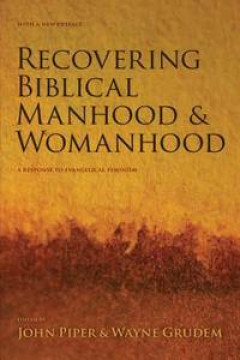
Recovering Biblical Manhood & Womanhood: A Response to Evangelical Feminism
In a society where gender roles are a hot-button topic, the church is not immune to the controversy. In fact, the church has wrestled with varying degrees of evangelical feminism for decades. As evangelical feminism has crept into the church, time-trusted resources like Recovering Biblical Manhood and Womanhood help remind Christians of what the Bible has to say. In this edition of the awar…
- Edition
- -
- ISBN/ISSN
- 9781581348064
- Collation
- Softcover; 575 hlm.; 15.49 x 22.86 cm
- Series Title
- -
- Call Number
- 261.8343
 Computer Science, Information & General Works
Computer Science, Information & General Works  Philosophy & Psychology
Philosophy & Psychology  Religion
Religion  Social Sciences
Social Sciences  Language
Language  Pure Science
Pure Science  Applied Sciences
Applied Sciences  Art & Recreation
Art & Recreation  Literature
Literature  History & Geography
History & Geography